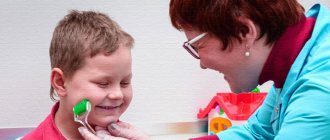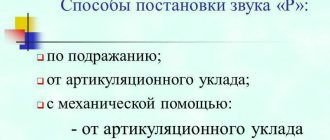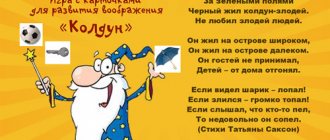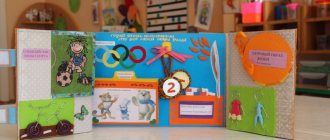Purpose of the lesson: we study the letter M, the formation of reading skills, the development of speech skills, the improvement of phonemic awareness, the basics of elementary graphic skills.
Tasks:
- introduce the preschooler to the letter M and the correct pronunciation of the sound;
- teach how to write the printed letter M in squares;
- to generate interest in learning poems and riddles.
Ask: How does a cow moo? (My!..) Say it like I do: MMMU. What sound did you make first?
Name what is shown in the pictures below:
Mouse
Carrot
Bear
Ant
MOUSE, CARROTS - tell me how I do. What is the first sound in these words?
When we pronounce the sound [m], the lips first close and then open.
Say: MMM.
The lips prevent air from leaving the mouth freely when we pronounce the sound [m]. Please remember: if you pronounce a sound, and your lips, teeth or tongue prevent the air from freely leaving your mouth, then this sound is a consonant. Some consonant sounds are pronounced with a voice, others without a voice.
Repeat: MMM. With or without voice, do we pronounce the consonant sound [m]?
If the child finds it difficult to determine the participation of the voice when pronouncing consonant sounds, here and in the future the child is asked to place his palm on his larynx. With the participation of the voice in pronouncing a sound, the child will feel vibration of the larynx (“neck trembles”). This is observed when pronouncing voiced consonants.
Who is bigger?
- Remember which berry begins with the sound [M] and ends with [A]. (Answer: raspberry)
- Name the flowers whose names contain the sound [M]. (Poppy, chamomile, mallow, daisies)
- List the products that have [M, M'] in their names. (Meat, margarine, butter, pasta, semolina, milk, tangerines, flour.)
Assignment: Printed letter M for preschoolers
- Look at the letter M. What does it look like?
- Form the letter M with your fingers.
- Write the letter M in the air.
Draw the sticks carefully along the cells with a simple pencil or ballpoint pen.
In cases where the child is asked to write a whole line of a letter, syllable or word, the adult gives a writing sample at the beginning of the line. If a preschooler has difficulties, then an adult can draw two approximate lines, or put reference points that the child will connect with lines, or write the entire letters, and the child will simply circle them in a different color. Calligraphy should not be required at this stage of training.
Print
Lesson notes - Sound and letter “M” for preschoolers with OHP
Synopsis of a frontal speech therapy session to prepare for literacy training for older children with special needs development.
Topic: SOUND AND LETTER “M”
TASKS:
Correctional and educational:
- learn to determine the first consonant sound, hardness - softness, sonority - dullness, position of sound in a word (beginning, end);
- consolidate the skills of clear pronunciation of the sound M, the concept of “syllable”;
- practice sound analysis and synthesis of syllables, dividing words into syllables;
- activate your verb dictionary.
Correctional and developmental: develop auditory attention, phonemic perception, articulatory and general motor skills, visual-motor coordination, memory, thinking.
Correctional and educational: cultivate a positive attitude towards classes; the ability to control one’s own speech; develop the skill of cooperation, the ability to listen to the interlocutor; cultivate respect for each other.
EQUIPMENT: pictures: girl Masha, cat Murka, flowers - daisies, poppies, tulips, asters, bells; semolina porridge and milk, pictures with and without sound M, capital letter M, mosaic, red and blue chips, sound track.
PROGRESS OF THE CLASS:
1. Go through the audio tracks, naming each vowel letter.
Today I want to tell you one amazing story about one amazing girl Masha. And she was amazing because every day she invented a new game for herself. So today Masha woke up, washed her face, did exercises and didn’t forget about her lips and tongue.
2. Articulation gymnastics.
a) Frogs smile - they pull their lips straight to their ears (“Smile” with closed lips); b) I imitate an elephant - I pull my lips with my trunk; c) The tongue is wide, smooth - it turns out to be a “scapula”
Today Masha thought: “This is the first sound I’ll hear, and I’ll be friends with it all day long.” Suddenly the cat Murka came running and started talking to Masha: “Mu-u-u-r-r..” Masha smiled - that means today I’m playing and making friends with the sound ... (which one, guys?) with the sound M.
3. Articulation and characteristics of the sound M
The lips are closed, the teeth are slightly open, the tongue lies calmly below. Consonant (there is a barrier - lips), firm, sonorous.
Masha went to the kitchen. Mom was preparing breakfast there. What kind of porridge did your mother cook, do you think: buckwheat, semolina or rice? Why? Masha went to the garden where the flowers grow, and sang songs along the way:
4. Reproduction of syllable rows: we-ma-mo, mo-we-mu, we-mo-ma... (everyone in turn helps Masha sing the song)
There were many flowers growing in the garden (pictures on the floor), but Masha chose flowers only with the sound M ( asters, daisies, bells, poppies, tulips ).
– What flowers should I pick? Why? (children's answers) What is a bouquet of poppies called if a bouquet of tulips is called a tulip bouquet? From poppies? ( poppy ), from daisies? ( chamomile ). Masha returned to the kitchen with flowers. And on the table there was already semolina porridge and milk . What was on the table? (semolina porridge and milk). Masha laughed: “Mommy, what a great fellow you are, you help me in my game.” - Why did Masha say that? Masha ate everything and said thank you. Now we will show Masha how we can play with sounds.
5. Sound analysis and synthesis of syllables.
Mark the syllables with chips: ma, om, mu.
Game "Live Sounds"
Masha took the book and began to look for pictures with the sound “m”. We also have pictures, take them under the chairs.
6. D/i “Find a picture with the sound “m.”
Determine where the sound M is at the beginning or end of the word. The one with the pictures with the sound M at the end, at the beginning, the pictures without the sound M will come out.
Let's divide the words you chose into syllables:
7. D/i “Divide the words into syllables” (children’s choice).
mu-ha - clap, ma-shi-na - stomp, mu-ho-mor - jump.
When dad returned from work, Masha talked about pictures with the sound “m” that she had been looking for all day. She also came across pictures - a fly , a car , a mouse . Dad asked what these objects do?
8. D/i “Choose an action word”
A fly flies, buzzes, bothers, sits, crawls... A car drives, stops, drives, drives in, drives out... A mouse squeaks, makes noise, gnaws, rustles, runs, jumps...
9. Introducing the letter.
Guys, we remember that we hear and pronounce sounds, but we see, read and write letters. So the sound “m” has its own letter “M”.
Stick and stick, Between them is a tick. And now it’s clear to everyone. The result is the letter “M”. Children lay out a letter from the mosaic.
10. Summary of the lesson.
What sound was there in class today? Is it a vowel or a consonant? Voiced or voiceless? Hard or soft?
PHYSICAL MINUTE (in the middle of the lesson) We use our hands - clap-clap-clap (6 times), We use our feet - stomp-stomp-stomp (6 times). Let's knock with our fists (6 times), turn around and remain silent (cover your mouth with your hand).
Anzhero - Sudzhensky urban district Municipal budgetary preschool educational institution combined type kindergarten No. 42 Author of the material: teacher-speech therapist: Levina Natalya Vladimirovna
Also on topic:
Summary of speech therapy lesson topic: Sounds M - M
Continue the sentence
He slept all winter in a fur coat, sucked his brown paw, and when he woke up, he began to roar. This is a forest animal... (bear).
Look at the fellows: Cheerful and lively. Dragging from all ends Material for construction. One suddenly stumbled and a friend rushes to the rescue. The people here are good. Without work, for the life of me. Can’t live... (ant).
Lyudmila went to wash her hands. She needed... (soap).
Everyone here in the forest is talented - both a singer and... (musician).
Our Tanya is crying loudly. Dropped it into the river... (ball).
The distance of the fields turns green, the nightingale sings. The garden is dressed in white, The bees are the first to fly. Thunder rumbles. Guess what month this is? … (May.)
We put the puppy in water and soap for two hours with a washcloth... (washed).
Under a heavy burden - Underground, in a closet. She lives in a hole. Gray baby. Who is this? ... (mouse.)
In a black field, a white hare jumped, ran, and made loops. The trail behind him was also white. Who is this hare? … (chalk.)
Riddles for children starting with the letter M
The giant stands in the port, illuminating the darkness, and signals to the ships: “Come and visit us!” (Lighthouse)
Above the river, across. The giant lay down stretched out. Across the river, along the back. He allowed me to walk. (Bridge)
The owner of the forest wakes up in the spring, And in winter, to the howl of a blizzard, He sleeps in a snowy hut. (Bear)
In the forest near the stump there is running and bustling: The working people are busy all day, building a house for themselves. (Ants)
The red nose has grown into the ground, and the green tail is outside. We don't need a green tail, we only need a red nose. (Carrot)
He flies all day long, bores everyone; The night will come. Then it will stop. (Fly)
Crowded, noisy, young, the city rumbles underground. And there are houses with people running along the street. (Metro)
It slips away like something alive, But I won’t let it go. It foams with white foam, I’m not too lazy to wash my hands. (Soap)
What kind of artist applied leaves, grass, and thickets of roses to the glass? (Freezing)
Small stature, long tail, gray coat, sharp teeth. (Mouse)
A red-hot arrow felled an oak tree near the village. (Lightning)
Liquid, not water. White, not snow. (Milk)
The white pebble melted and left marks on the board. (Chalk)
Horned, but not butting. (Month)
MAGAZINE Preschooler.RF
Sounds "M" "M". Letter "M" "Food" Purpose: Systematization of children’s knowledge about the classification of food products. Introduce children to the mechanism of formation of the sounds “M”, “M”. Correctional and educational. Strengthen the ability to isolate sounds from words. Compare the articulation of the sound “M” with the articulation of the vowel sounds “A”, “O”, “U”. Introduce the term “consonant” sound. Learn to conventionally designate consonant sounds (hard voiced sounds - with a blue chip with a bell, soft voiced sounds - with a green chip with a bell). Correctional and developmental. Exercise children in dividing words into syllables. Continue to teach children to highlight the sounds “M”, “Мь” at the beginning, middle, and end of a word. Develop fine, gross and articulatory motor skills. Teach children diaphragmatic breathing, changing the strength and pitch of the voice. Develop phonemic hearing and perception. To form self-control of speech in children through oral, tactile-vibration and acoustic control.Correctional and educational. Formation of a positive attitude towards participation in the lesson. Equipment: Kar-karych, Sovunya, pictures of a machine, fly, poppy, ball, sounds for consonant voiced sounds, pencil cases, cut alphabet, demonstration material for the letter “M”, seeds, counting sticks, sponges. Integration: “Cognition”, “Socialization”, “Physical development”, “Safety”, “Health”. GCD move. I. A) Game with a ball “Think and answer” The game helps to activate verbs that are similar in meaning. Speech therapist (throws the ball to the child and asks questions). Are the cutlets boiled or fried? Tell me what else is being fried? Child. Fish, egg, potatoes. Speech therapist. Is the bread baked or stewed? Tell me what else they bake? Child. Pies, cakes, cookies. Speech therapist. Is the milk boiled or boiled? Tell me what else they cook? Child. Porridge, soup, compote, pasta. B) Game “Dividing words into syllables” (with sponges) Milk poppy coffee flour soup bun salt sour cream kefir sausage cheese fish juice sugar cake salad jelly C) D/i “Remember and name” Children must remember words that have the sound “ Oh" (sit down). Mule soup beech juice fluff Mol son bok buk kol Mal son bak som pas D) Facial massage Performing a massage jointly with a speech therapist Affectionate kitty licks Stroking movements Goat butts with small horns Tapping with fingertips Cat sharpens claws Rubbing movements along massage lines Affectionate kitty caressing Stroking movements
II. A) We know that there are sounds that can be pronounced and drawn out for a long time and loudly, without anything getting in the way in the mouth, there is no barrier - as such sounds are called - VOWELS. A U O B) There are sounds that are pronounced using the lips, teeth, and tongue. These are CONSONANT sounds. - Today we will get acquainted with one of the sounds, it is hidden in the words: MAC FLY MACHINE - What is the same sound we hear in the words - “M” - Say the sound “M”. When pronouncing the sound "M", does air flow freely? (No, the air meets an obstacle) - What obstacle does the air meet? (Lips get in the way) -If, when pronouncing a sound, the air encounters an obstacle, then this sound is called a consonant. — We denote hard consonant sounds with blue chips. C) Characteristics of the sound “M” - The sound “M” is a consonant, because when it is pronounced, the air encounters an obstacle. This sound is loud. Place your hand on the neck and say the sound “M”, you will feel the neck “trembling”. The sound “M” is hard and sonorous; we will denote it with a blue chip with a bell. Children characterize the sound “M”, based on the questions of the speech therapist: - Is the sound “M” a consonant or a vowel? Why? — Is the “M” sound voiced or unvoiced? Why? — Is the “M” sound hard or soft? - What color do we use to represent the sound “M”?
III. Physical exercise. Drink tomato juice, walk in place, eat carrots! Hands to shoulders, hands up. All the guys will put their hands on their belts, bend to the side. Strong and dexterous hands on their belts, squats. Flu, sore throat, scarlet fever - hands on the belt, jumping Everyone will drive away the vitamins! walking in place.
B) Work on developing breathing and voice. Inhale and as you exhale say M-M-M-M-M
IV. Riddle (PICTURE) They beat him with a hand and a stick - No one feels sorry for him. Why are they beating the poor guy? And for the fact that it is inflated... (ball) A) - Say the sound “M”. When pronouncing the sound “Мь”, does air flow freely? (No, the air meets an obstacle) - What obstacle does the air meet? (Lips get in the way) - Say the sounds “M” “M” alternately. Are your lips pursed with equal force? (When pronouncing the sound “M”, the lips are compressed more tightly.) This sound is called soft. — We denote soft consonant sounds with green chips. B) Characteristics of the sound “M” - The sound “M” is a consonant, because when it is pronounced, the air encounters an obstacle. This sound is loud. Place your hand on the neck and say the sound “M”, you will feel the neck “trembling”. The sound “Мь” is soft, sonorous, we will denote it with a green chip with a bell. Children characterize the sound “M”, based on the questions of the speech therapist: - Is the sound “M” a consonant or a vowel? Why? — Is the sound “Мь” voiced or unvoiced? Why? — Is the sound “M” hard or soft? - What color do we use to indicate the sound “Мь”?
V. Didactic game “Stone - cotton wool” A mouse is scratching on the floor, A brown bear is sleeping in a den, This bear is very cute, Only he did not wash his paws. The mouse ran into the hole, the bear went to sleep in the den, the boy is small, but very cute. He washed his hands with water.
VII. Introducing the letter. Characteristics of the letter "M". 1. Showing the letter by a speech therapist. The letter “M” with two humps, Like a camel - see for yourself.
We must take two sticks diagonally, and, as everyone understands, the letter “M” appears. 2. In individual cash registers, find the letter (large and small). Review and answer the questions. - How are large and small letters similar? (they are the same shape) - What is their difference? (they differ in size) - What elements does the letter “M” consist of? — What objects does the letter “M” resemble? (for a donut, a hoop, a steering wheel, a wheel) - House of Consonants. — Trace the letter “M” with your finger, print it with your finger on the table, in the air (I do it on the board), lay it out with seeds.
RESULT. REFLECTION.
| Next > |
Tale about the letter M
The mouse Mouse and the bear cub Misha were lying in the clearing and eating raspberries. The mouse says: “Let’s come up with poems.” Listen to what I wrote:
Every day and every hour we stubbornly repeat: There is no one in the world better than ours...
- Raspberries! - Misha yelled. - What does “raspberry” have to do with it! I wanted to say: “Better than our mother.” - That's great too! And now I’ll write... What about? - Well, at least about this fly agaric.
Don't eat white pasta, but eat red fly agarics!
- What are you, what are you! - The mouse was scared. “You can’t eat fly agarics, you’ll end up in the hospital.” Here, listen to the verse about the doctor:
There is no more important doctor in the forest than the lively redhead...
- Aibolit! - the bear cub yelled. - Yes, not Aibolit, but an ant. Aibolit heals animals, and the ant heals the forest. - How do you know so much? - He who reads a lot knows a lot! - the mouse Mouse answered importantly...
(G. Yudin)
Funny poems about the letter M for children
Let's sit in silence. Mom is sleeping, she's tired... Well, I didn't play! I don’t start the top, but I sit down and sit. My toys don't make noise, The empty room is quiet. And a golden ray creeps across my mother’s pillow. And I said to the beam: “I want to move too!” I would like a lot: To read out loud and roll the ball, I would sing a song, I could laugh. There's so much I want! But mom is sleeping, and I am silent! The beam darted along the wall, and then slid towards me. “Nothing,” he seemed to whisper, “Let’s sit in silence... (E. Blaginina)
Confused - Look - the letter!.. Here are the ones on: Not in the book - on the path! What is it called? Similar to horns? A learned dog, a bull and a goat Stare at her... The goat figured it out in her mind, Said: - This is the letter “me.” The bull objected: “Not “me,” but “mu.” I know better what’s what!” - And the dog exclaimed: - Come on, don’t argue, this is the letter “am”! - No, “mu”! - No, “meh”! - Not there"! Am! Am!
We took the multiplication tables and hid them. Give us Microcalculators to speed it up! (E. Grigorieva)
Mom, grandmother, sister - Everyone is dressed up in the morning. Congratulations are accepted. Even though it's not their birthday. Each holiday gift and bouquet - it is very bright. And another surprise awaits them - Dad and I baked a cake. We washed all the dishes and put things in order everywhere. We forgot the word laziness. This is what Women's Day means! And my sister asked us: “Will this happen every time?” (V. Nesterenko)
Mother! I love you so much that I don’t even know! I will give the name “Mama” to the big ship. (Ya. Akim)
Lighthouse...In the evening, as well as at night, it is very difficult to swim in the sea... The captain is so upset - you can’t even see the shore. Suddenly the sailor is delighted: the LIGHTHOUSE lights up. A red eye just appeared at the very top of the head. He blinked, and again it didn’t, and the light came on again. Here, they say, it’s quiet - all ships sail here... The light shows everyone whether it’s dangerous here or not. (V. Mayakovsky)
The bear cub Mishka climbed into the hive, and now sweet honey drips from his paw! I started laughing at him: “The little bear made a joke!” - What kind of jokes! - he answered. - I am a bear! I've been a bitch! (M. Yasnov)
It's March, and there's a snowstorm and frost... We bought mimosas for mom! (E. Blaginina)
Poor Mishka got sick - Mishka ate a lot of honey. The bear cries and shouts: “My stomach hurts!” The bear is moaning. Tears are shedding - His stomach hurts. Naughty Greedy Bear Ate a forest raspberry Lishka. (F. Bobylev)
The pen runs up and down, drawing the letter M, as if you were going down the subway and then going up. Soft light falls on smooth marble and granite. The staircase itself runs here - And there is no end to it. (S. Marshak)
Ball A colored ball is jumping in the yard in front of me. This ball is very cute: It hasn't broken glass yet. (G. Vieru)
Bear march and bear waltz! A bear with an accordion in the arena. A she-bear dances with a bear. The little bear waves his paw at them. (V. Berestov) The ball flies striped. Bear cubs play ball. - Can I? - asked the mouse. - What you! You're still a baby. (G. Satir)
Articulation and pronunciation of M
If we pronounce a word that contains such a sound, for example: ball, Masha, we will feel that the lips are slightly compressed, the tongue inside the oral cavity is moved back a little and even slightly pulled up to the upper palate with its middle part.
Then we feel the air begin to come out through the nose. A voice is heard, i.e. the sound is loud.
He doesn't have a partner, i.e. there is no sound similar to [m], but dull.
It can be pronounced firmly or softly. It depends on the letters next to the M.
Carrot - ball (hard - soft).
Remember: The letter M stands for the consonant sound [m]. It can be hard or soft, but it is always a labial nasal sonorant sound. The sound is softened by vowels - e, e, i, i and a soft sign: mint, chalk, bear, eight and others.




